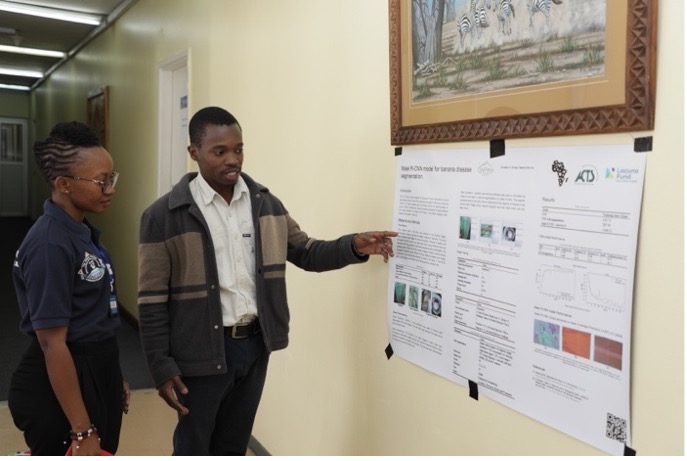By Dr. Neema Mduma
Crop diseases are substantially problematic for agricultural yield management and a major threat to food security. On addressing this challenge which facing agricultural sector in Tanzania, Dr. Neema Mduma, a lecturer at the Nelson Mandela African Institution of Science and Technology (NM-AIST) in Arusha, Tanzania, is developing a mobile application for early detection of diseases affecting maize and banana.
She is a Post doctorial researcher under the Artificial Intelligence for Development Africa (AI4D Africa) funded by IDRC & SIDA. Dr. Mduma is currently supervising two Masters’ scholars (Christian Elinisa and Flavia Mayo) admitted at the NM-AIST with support from the AI4D Africa project implemented by the African Centre for Technology Studies (ACTS). Dr. Mduma is leading the project which focuses on applying machine learning on addressing challenges facing agricultural sector particularly in crop diseases. Crop diseases are substantially problematic for agricultural yield management and a major threat to food security. Compounded with insufficient information to correctly diagnose crop diseases, can lead to significant economic loss and yield inefficiencies. However, identifying the diseases rapidly is still a difficult task in many parts of the world including Tanzania due to the lack of the necessary infrastructure.

“My research is focused on developing the Deep Learning Techniques for Early Detection of Crop Diseases. I have decided to work on this area due to the fact that, deep learning techniques when accurately trained, provide convenient solutions to the problem as compared to the traditional approaches. However, training deep learning models require large amount of data, and most developing countries including Tanzania are still lacking sufficient data to facilitate research activities in this field. Therefore, this project aims to generate datasets that will facilitate machine learning activities and develop deep learning techniques for early detection of maize and banana diseases. The model will then be deployed in a mobile based application to allow stakeholders to easily interact with the developed solution.”
There are numbered of crops which are highly affected by diseases however, Dr. Mduma decided to focus on maize and banana. This is because maize and banana are among the important staple food and cash crops which are largely produced by smallholder farmers with more than 70 million people producing throughout the humid and sub-humid tropic of Africa. Regardless of their importance in the household food security and subsistence, these crops are largely affected by diseases particularly maize lethal necrosis and maize streak for maize and black sigatoka and fusarium wilt race 1 for banana. Automated detection and quantification of plant diseases would enable more rapid gains in plant breeding and faster scouting of farmers’ fields. However, training a deep learning model to accurately detect a given disease from images taken in the field requires a massive amount of human-generated training data. Since, there are lack of publicly available datasets to facilitate machine learning activities in Africa, this project proposed to generate datasets for maize and banana images and develop deep learning techniques for early detection of crop diseases. The expected outcome of the proposed study is a mobile application for small-holder farmers to easily identify and detect crop diseases for early intervention. Furthermore, the datasets generated from this project will be shared in machine learning open access platforms to facilitate research and teaching at different initiatives in Africa and globally.
“The application developed from this project will help small-holder farmers and agricultural extension officers to early detect maize lethal necrosis and maize streak for maize and black sigatoka and fusarium wilt race 1 for banana. The technological solution developed from this project, will help agricultural stakeholders to have early disease detection tool which will help them to opt for reliable control measures for more productivity.”
Dr. Mduma and her students have started to disseminate preliminary findings of this project through different platforms. On 25th November 2022, Christian Elinisa and Flavia Mayo presented their papers in the 1st International Conference on Technological Advancement in Embedded and Mobile Systems (ICTA-EMOS) titled, “Mask R-CNN Model for Banana Disease Segmentation” and “Convolutional Neural Network Deep Learning Model for Early Detection of Streak Virus and and Lethal Necrosis in maize: A case of Northern-highlands, Tanzania” respectively. The papers will be published in Springers and the book of abstract can be accessed in this link: https://icta-emos.org/wp-content/uploads/2022/11/10112022_UOL_NM-AIST_Book-of-Abstract__DS.pdf
The preliminary findings of this project were also shared in the ICTA-EMOS poster sessions.
 |  |
Flavia Mayo (left) and Christian Elinisa (right) and in the ICTA-EMOS poster session
 |  |
Poster session in the ICTA-EMOS with conference General Chair, Prof. Dr.-Ing. Jorge Marx Gómez from the Carl von Ossietzky University of Oldenburg (Germany)
The preliminary findings of this project were also disseminated in the Neural Information Processing Systems (NeurIPS) conference, Women in Machine Learning (WiML) and Black in AI Workshops in New Orleans, Luisiana (USA) in December 2022.
